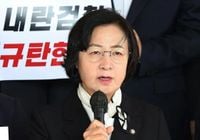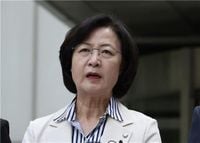On June 21, 2025, the United States launched a direct military strike against three major Iranian nuclear facilities located in Fordow, Natanz, and Isfahan. Former President Donald Trump announced the attacks on his social media platform, Truth Social, describing them as a "very successful attack" that completely destroyed Iran's key uranium enrichment sites. In a subsequent emergency press conference, Trump declared that the strikes were a "military and extreme success," warning that Iran would face even stronger attacks if it did not abandon its nuclear weapons development entirely.
However, this unprecedented move by the U.S. has sparked intense controversy and criticism, particularly from South Korean lawmakers and international observers who question the legality and legitimacy of the strikes under international law. Among the most vocal critics is Choo Mi-ae, a six-term lawmaker from South Korea's Democratic Party and a member of the National Assembly's National Defense Committee. On June 22, 2025, Choo took to social media to condemn the U.S. action, stating bluntly that "the United States crossed the Rubicon." She argued that the direct attack on Iran, a country that had not attacked the U.S., constituted an unjustified, internationally unacceptable preemptive attack.
Choo emphasized the principle of preemptive self-defense under international law, which requires a "clear and present danger" before the use of military force can be deemed lawful. She pointed out that neither the U.S. nor Israel, which had also recently attacked Iran's nuclear facilities on June 13, 2025, had met this standard. "Both the June 13 Israeli attack and the June 21 U.S. bombing violated international law," she asserted.
Adding weight to her argument, Choo cited testimony from former U.S. Director of National Intelligence (DNI) Dan Coats, who stated in March 2025 before the U.S. Senate Intelligence Committee that "it would take Iran three years to possess nuclear weapons." She also referenced the International Atomic Energy Agency (IAEA) Director Rafael Grossi, who regularly monitors Iran's nuclear facilities and testified there was no evidence that Iran was enriching uranium for weapons purposes.
Despite these authoritative assessments, President Trump publicly discredited Coats, calling his testimony "wrong" in a June 20, 2025 statement, which Choo criticized as undermining the credibility and courage of an intelligence chief simply doing his job. "Coats' conviction and courage are very admirable," she said.
Choo further criticized the U.S. government for framing the attack as a "physical conflict" rather than acknowledging it as a direct act of war, suggesting this was a deliberate attempt to downplay the severity and avoid international responsibility and post-war reparations. She wrote in a follow-up post titled "The U.S. Steering Wheel is Gone" that the U.S. attack was a direct intervention in the ongoing Israel-Iran conflict and questioned whether the U.S. was trying to evade the consequences of war by manipulating language.
Her concerns extended to the broader geopolitical implications, especially for South Korea, which remains a nuclear-armed nation in a volatile global environment. She stressed the need for "a globally balanced perspective" to prevent political and economic fallout from the escalating Middle East tensions. "We must have the ability to grasp the situation," she said, highlighting the risks of "political and economic shrapnel" falling on Korea amid "a world where power politics are out of control."
Within South Korea's Democratic Party, there was a mix of criticism and cautious analysis. Lawmaker Park Sun-won, a former first director of the National Intelligence Service, suggested that the U.S. strike reflected acceptance of Israel's assessment that Iran's nuclear material extraction had accelerated to a pace that could soon lead to weapon development. However, he called for further verification to determine whether this judgment was based on solid evidence or politically distorted information. Park also urged a measured response, noting that since the U.S. attack was limited to nuclear facilities, it was necessary to observe the situation comprehensively and calmly rather than rush to judgment on international law violations.
Meanwhile, Democratic Party lawmaker Kim Hyun highlighted domestic U.S. criticism, noting that the attack was carried out without congressional approval and raised concerns about constitutional violations. Kim wrote on social media that it would be difficult for the U.S. to secure legitimacy under international law for an attack on a country that had not launched a preemptive strike.
The Democratic Party's official stance, conveyed through spokesperson Han Min-soo, was more measured. The party pledged to cooperate closely with the South Korean government to mitigate the impact of Middle East instability on energy supplies and global supply chains, expressing sincere hopes for the rapid de-escalation of tensions and restoration of peace and stability in the region.
However, some criticism arose within the ruling party regarding outspoken individual opinions blaming the U.S. for the situation, which some viewed as unhelpful to South Korea's national interests. From the opposition, People Power Party lawmaker Kim Gun cautioned that strong statements from ruling party members, made before the South Korean government had clearly articulated its position, risked being mistaken for official government policy. He stressed the importance of coordinated messaging, especially ahead of critical diplomatic events such as the upcoming Korea-U.S. summit and trade negotiations.
The U.S. Congress’s role has also come under scrutiny. In 2023, the Biden administration oversaw the repeal of the Authorization for Use of Military Force (AUMF) granted after the 9/11 attacks, restoring Congress’s war declaration powers. Yet, an exception clause allows the president to respond to "destabilizing malicious tactics" by countries like Iran, North Korea, Russia, and China, effectively limiting Congress’s ability to check preemptive strikes initiated by the president. Choo Mi-ae pointed out that this creates a "double-edged sword" where the president’s authority to conduct preemptive attacks remains largely unchecked.
The unfolding events mark a significant escalation in U.S.-Iran tensions, with the U.S. directly targeting Iran’s nuclear infrastructure for the first time. As citizens in Seoul and around the world watched President Trump's address on the attacks, the international community faces complex questions about the legality, morality, and geopolitical consequences of such military actions. The debate continues over whether the strikes will deter Iran’s nuclear ambitions or further destabilize an already volatile region.
In this fraught context, South Korean lawmakers and officials are navigating a delicate balance between condemning perceived violations of international law and managing the practical realities of alliance and regional security. The coming days and weeks will be critical in shaping the diplomatic and security landscape not only for the Middle East but for global powers watching closely, including South Korea.


